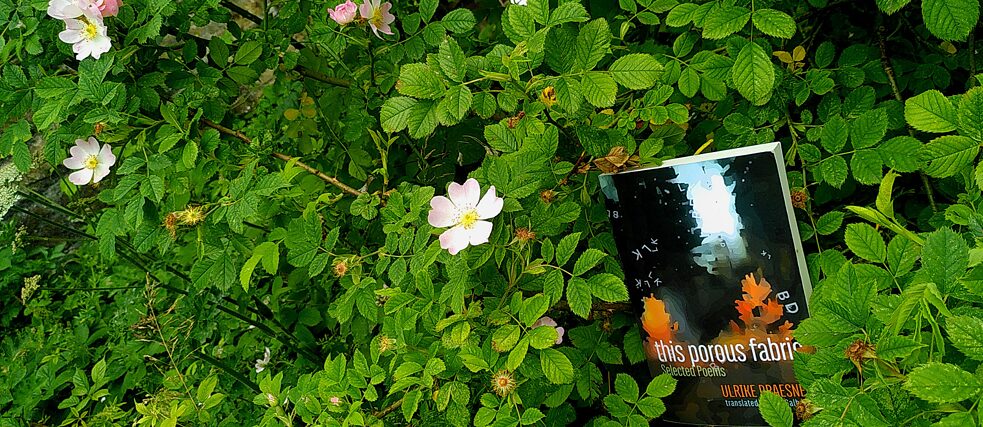July 2022
Ulrike Draesner: This Porous Fabric

Ulrike Draesner’s poetry offers fans of Scotland’s beloved Edwin Morgan much to love.
It feels slightly sacrilegious to compare anyone to Scotland’s inaugural Makar, or poet laureate, Edwin Morgan. Morgan died just before I graduated from university, but throughout my career I’ve been surrounded by people who remember “Eddie’s” generosity with deep love and respect. One of the foremost Scottish poets of the twentieth century, Morgan was set apart from his peers by his inventiveness and deep-seated internationalism. (Recently, when I introduced myself to a Brazilian writer as Scottish, she responded, “Ah! Edwin Morgan!”) For myself, I love Morgan’s serious sense of fun (check out The Loch Ness Monster’s Song) as well as the tenderness in poems like Strawberries.
And yet Morgan is the comparison I find myself reaching for when trying to describe Ulrike Draesner’s wide-ranging work, a selection of which recently appeared in as a bilingual edition with Iain Galbraith’s inventive translation as this porous fabric. What draws me to Draesner is what I love about much of Morgan’s work: a playful willingness to break language down to its smallest elements and put it back together again. In ‘Exit Strawberry Clover’, a poem which for me reflects the loss of biodiversity, the text is repeated over and over, losing more letters in each iteration until it is finally distorted beyond all sense. In other poems, like ‘paprika mamrika’, she plays around with the letters her daughter is learning to speak:
she’s been saying r for three days and
how did she say “paprika” after nursery
“mamrika” we raughed ran yerred
rets go: to buy her a bike-berr as a reward
Elsewhere, Draesner’s exuberant inventiveness weaves the calls of birds into her poems, and in his translations, Galbraith really embraces Draesner’s invitation to be playful: “whit whit whit / gt wedder innit / ndits sprrrrrrrrring / innabit”.
The natural world comes to the fore in Draesner’s later work in particular, and she manages to combine a sense of joy and awe with a recognition of the destruction often wrought by humans; in ‘pastorale’ “two snow-white birds at the end / of the parking lot” turn out to be “two / canisters. snow white / snow white biocide”.
Draesner’s use of punctuation is sparse, and reading her poems is sometimes like gazing through a dark glass, slowly adjusting to the light and piecing together the images to make a whole. This might sound off-putting, but her poems still manage to be strikingly immediate (“the screeching tram the way it / took the tightest of curves”, one begins). Instead, the poems ask to be re-read, read slowly, read out loud – they invite the readers in, and ask us to find our own way through the space they have created.
About the author
Annie Rutherford makes things with words and champions translated literature in all its guises. A writer, translator and events organiser, she's currently researching the possibility of setting up a Writers in Exile residency in Edinburgh, and also runs Lighthouse Bookshop's Women in Translation book group. She can spot a misplaced apostrophe at a distance of fifty yards.Glasgow library: Other works by Ulrike Draesner.
E-Library: Other works by Ulrike Draesner.
Find out more about the blog.
Book Blog Overview